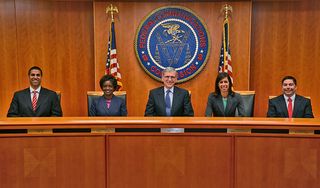FCC Fines Verizon Over Supercookie Probe

The FCC announced that it will fine Verizon for its use of a “supercookie” probe to gather data on its service users, which it then sold to other companies for advertising purposes.
The FCC carried out a lengthy investigation that began in December 2014 to determine if claims about Verizon’s use of these supercookies was true, and if the company violated end users’ right to privacy. The FCC ultimately found that Verizon was indeed inserting supercookies into its Internet service without the consent of its customers and was thereby violating their privacy.
“Consumers care about privacy and should have a say in how their personal information is used, especially when it comes to who knows what they’re doing online,” said FCC Enforcement Bureau Chief Travis LeBlanc. “Privacy and innovation are not incompatible. This agreement shows that companies can offer meaningful transparency and consumer choice while at the same time continuing to innovate. We would like to acknowledge Verizon Wireless’s cooperation during the course of this investigation and its willingness to make changes to its practices for the benefit of its customers.”
Verizon attempted to fight the claim that its use of supercookies violated user privacy rights, asserting that third-party advertisers didn’t use the data collected to build consumer profiles that identified individuals for targeted advertising, and that the users could clear the data stored by the supercookies at any time.
However, the FCC found that Verizon’s advertising partners had used this information to build consumer profiles and kept supercookie data after users had deleted it, which removed Verizon’s customers’ ability to regulate the collected data in any way.
To resolve the situation, the FCC fined Verizon $1.35 Million and forced the company to revise its supercookie program. Now, Verizon must notify all users about its use of supercookies, and it must allow users to opt out or opt in to the supercookie program. Verizon cannot legally use supercookies to gather data on users that opt out of the program.
Follow Michael Justin Allen Sexton @EmperorSunLao. Follow us on Facebook, Google+, RSS, Twitter and YouTube.
Stay on the Cutting Edge
Join the experts who read Tom's Hardware for the inside track on enthusiast PC tech news — and have for over 25 years. We'll send breaking news and in-depth reviews of CPUs, GPUs, AI, maker hardware and more straight to your inbox.
-
jeremy2020 1.35 Million...oh, no, someone had to look in the couch cushions. Toothless. How is this even going to be monitored and enforced?Reply -
Joe Black The thing with these schemes are that they are usually so profitable that a little slap on the wrist will not deter people from going for it. The problem is much more serious that they let on. Of course if people enjoy privacy from companies then people will gripe more about privacy from government... Just saying.Reply -
clonazepam Verizon's campaign contributions and lobby spending in 2014 was an order of magnitude different than this fine. I don't see how this would ruffle anyone's feathers over at Verizon.Reply -
Chris Droste the fine should have been $135million (ON HUNDRED AND THIRTY-FIVE)Reply
Verizon probably smiled, shook hands with the FCC and wrote off the loss without any foreseeable impact to their business. -
Patrick_Bateman Hmm, so when is the FCC going after the NSA, FBI and CIA for their unconstitutional methods of surveillance?Reply -
mrmez "The FCC carried out a lengthy investigation that began in December 2014"Reply
"would like to acknowledge Verizon Wireless’s cooperation during the course of this investigation"
Yep. Sounds like they fully co-operated. -
fixxxer113 Replythe fine should have been $135million (ON HUNDRED AND THIRTY-FIVE)
Verizon probably smiled, shook hands with the FCC and wrote off the loss without any foreseeable impact to their business.
Dude, don't say that... I heard that they would have to go for a week without soy latte in their office kitchen. Can you imagine the horror??
On a more serious note though, I think that the only way to stop this kind of mass data theft is to consider it legally as espionage. And if you think about it, there is no way of telling where that data can end up and for what use, as we see from the article. This should be a very serious offence against national security.
Most Popular


